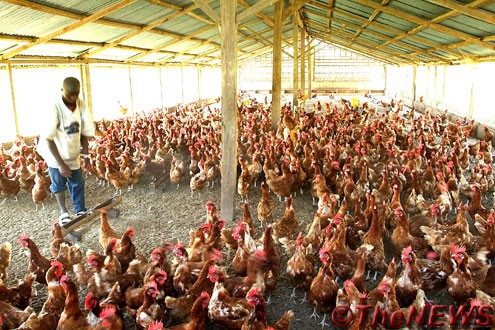The land border closure with neighbouring countries has saved the poultry industry in Nigeria about N50 billion since its commencement in October, an official has said.
Eustace Iyayi, Registrar and Chief Executive Officer of the Nigeria Institute of Animal Science (NIAS), made the disclosure at a news conference in Abuja during a news conference with the theme, “Nigeria border closure: Impact on the livestock sub-sector, food security and employment generation.”
According to Mr Iyayi, the multiplier effect of the border closure has also reflected on the upsurge in the operations along the value chain with regards to supply of inputs, storage facilities, transportation/logistics and value addition.
He said that given Nigeria’s huge total feed output of 5.3 million metric tonnes in 2016, 80 per cent of the output was attributable to the poultry industry.
“With an estimated 180 million poultry population and annual output in excess of 700,000 metric tonnes of eggs, that is about 450 million crates of eggs and 300,000 metric tonnes of meat, one can only imagine the several hundreds of thousands.
“This is perhaps, with millions of direct and indirect jobs created by the industry in its entire value chain, in conjunction with its related ancillaries.
“It is indeed an almost endless web of commercial activities.
“These ranges from hatcheries, day-old chicks distribution, broiler/layer farming, broiler processing, poultry meat and egg retail shops, crop processing, raw materials supply, feed mill operations, feed distribution, among others, ” he said.
The registrar emphasised that the huge impact could, however, grow exponentially and be translated to more concrete economic gains and accelerated growth of the nation’s poultry industry.
According to him, the growth could go beyond the current estimated annual rate of 3.3 per cent, by taking total control of local market.
Mr Iyayi said that it was clear that poultry sub-sector, the most commercialised of all Nigeria’s agricultural sub-sectors with a current net worth of N1.6 trillion, will play a significant role in contributing to the current government’s effort to create 100 million jobs.
“Before the border closure, the poultry industry in the livestock sub-sector was badly hit.
“Nigeria consumed about two million tonnes of poultry meat annually, 70 per cent of which was imported. Poultry meat was heavily smuggled into the country through our land borders.
“The imported products, often of lower quality, attracted lower prices. This led to the closure or down sizing of several poultry farms with consequential business and job losses along the poultry value chain.
“According to the Poultry Association of Nigeria (PAN) the closure of Nigeria’s border by the Federal Government is currently reducing smuggling of chicken into the country and will further cut this down by one million tonnes annually if the effort to stop smuggling is sustained,” Mr Iyayi said.
The registrar pledged the support of the institute to the government ‘s closure of border policy.
He explained that the drastic reduction in smuggling of finished commodities into the country would enhance the increased production of primary products that are processed to obtain the final products.
According to him, increased primary production would further translate into more food thereby enhancing food security.
Mr Iyayi said that the NIAS’ ultimate goal was to guarantee food security and have the Nigerian livestock industry organised enough for self-regulation in line with global best practices, leaving no breathing space for quackery and adulteration.
He reaffirmed that on August 20, President Muhammadu Buhari ordered a partial closure of the land borders with Republic of Benin, Niger Republic and Cameroon to facilitate a joint operation.
The operation he said was named “Swift Operation“, involving Customs, Immigration, Police and Army officers.
He said “the reason for the closure was to curb the massive smuggling activities along the borders, especially rice, poultry meat and fuel.”
The NIAS was established by Act No 26 of 2007 as amended in 2015 to regulate all matters pertaining to animal husbandry in Nigeria.
This includes the advancement of the education, science, technology and the art of animal science and livestock production.
PV: 0
You may be interested

Barcelona Target Osimhen As Possible Replacement For Lewandowski
Webby - March 18, 2025Spanish La Liga giants Barcelona have set their sights on Victor Osimhen as a possible replacement for Robert Lewandowski. Osimhen,…

2026 WCQ: Rwanda Midfielder Manishimwe Keen To Face Super Eagles
Webby - March 17, 2025Rwanda midfielder Djabel Manishimwe says he is fired up for the clash with the Super Eagles of Nigeria. Manishimwe has…

2026 WCQ: Zimbabwe Suffer Injury Blow Ahead Super Eagles Game
Webby - March 17, 2025Warriors of Zimbabwe suffered a blow ahead of their 2026 FIFA World Cup qualifiers with Nigeria’s Super Eagles and Benin…























![American Pastor, David Wilson Seen Eating The Box Of Woman Who Isn’t His Wife [Video]](https://onlinenigeria.com/wp-content/uploads/2019/10/american-pastor-david-wilson-seen-eating-the-box-of-woman-who-isnt-his-wife-video-150x150.jpg)










Leave a Comment